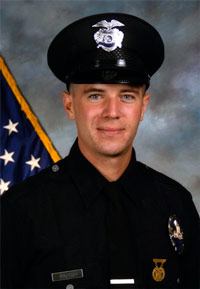From the dusty streets of Ramadi, Iraq, to the halls of the highly reputed Los Angeles Police Department, Brandon Parks’ uniform has changed, but his mission has remained the same.
It is a mission of service, sacrifice and the preservation of freedom — his pursuit while an Army sergeant and, now, a police officer.
“Our motto is to protect and serve. We’re out there to give people a chance to live their dreams,” said Parks, who graduated from the Los Angeles Police Academy last month at the top of his class — the recipient of the Academic Achievement Award, Top Physical Conditioning Award and the William H. Parker Award for Overall Excellence.
Parks was added to the Congressional Record — which contains all proceedings of the U.S. Congress, including debates and remarks — on July 15 for his accomplishments, upon the recommendation of Rep. Dave Reichert, who submitted a statement commending Parks to the U.S. House of Representatives.
“I want to focus my remarks on the exceptional way Brandon conducted himself during his 24-week training,” Reichert stated in the text of Parks’ Congressional Record entry. “No matter the amount of physical, mental and emotional fatigue Brandon may have felt, he graduated on June 19 with outstanding final marks.”
The statement also acknowledges that the “House owes Brandon a debt of gratitude” for serving in Iraq.
During three years in the Army, Parks worked as a counterintelligence agent — completing one tour of duty in Iraq — and achieved the rank of sergeant in the 1st Infantry Division, 2nd Brigade Combat Team, 177th Armor Battalion.
“I wanted to do something that was exciting, that I would be good at. I wanted to be out on combat patrols with the guys, and being an enlisted guy gave me a chance to do that,” he said. “Our job was to engage the public out on combat patrols, take the information and turn it into intelligence to direct our operations.”
Parks also helped train Iraqi army battalions and intelligence sections and participated in house raids as well as three major operations which involved clearing villages, hunting down enemies and taking out snipers. He spent 15 months in Ramadi, located 70 miles west of Baghdad. It was one of the most dangerous cities in the world when he arrived, he said, but by the end of his tour in November 2007, walking in the streets without wearing armor was safe.
It wasn’t easy, Parks said. He lived in a converted prison cell. He couldn’t see his family. He grieved at comrades’ funerals.
“Family has always been top for me. Being away from them halfway across the world — it was difficult to deal with that,” said Parks, who visited Mercer Island last week to celebrate his brother’s and cousins’ birthdays. “The hardest part is losing friends, and military funerals — I attended way too many.”
Still, he said, “I believed in what we were doing. I believed in the mission.”
After completing his tour in Iraq, Parks returned to California, where he had moved after graduating from Mercer Island High School in 1999. Parks studied at the University of California, Los Angeles, where he earned a bachelor’s degree in psychology in 2003.
After returning from Iraq, Parks became an assistant manager at Starbucks, but the job was boring, he said, and he decided to pursue his childhood dream of becoming a police officer. He was impressed by the LAPD, which is regarded as “the best” nationwide, and its history of progressiveness — such as hiring the first African-American and Hispanic police officers — not to mention its high public approval rating, currently at 83 percent. Now, the MIHS graduate patrols the Foothill Division of the sprawling city.
“Every call you go to is something different. Everyone’s looking at you to bring order to the situation,” he said.
Parks is left with little spare time, as his hours regularly accrue into overtime beyond the standard 12-hour, three-day shifts. Just last week, he put in 18.5 hours of overtime, working as many as 19.5 hours in one day.
“When you get off, you want to crash,” Parks said. But, he couldn’t be happier, he noted. “It’s a really rewarding position when you do it right. For me, it was always about being that shield, and wearing that shield to protect the public. Now, here I am, doing it, and it’s everything I hoped it would be.”




